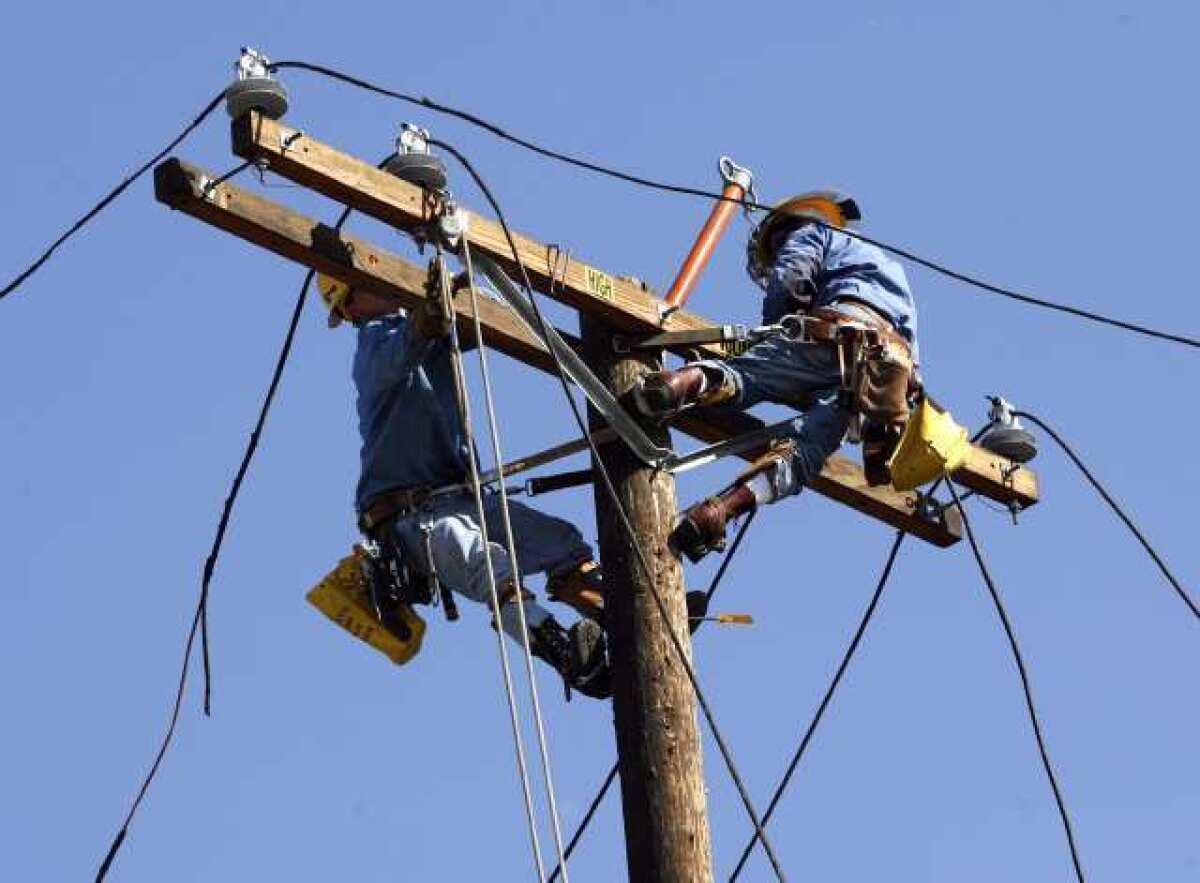Electric rates stir up crowd

- Share via
City officials on Wednesday embarked upon a series of public outreach meetings to explain the need for higher electricity rates. Instead, they found themselves defending the transfer of millions of dollars from the utility to Glendale’s coffers — a move critics say artificially pushes rates up.
Glendale Water & Power is seeking a 14.7% electricity rate increase over four years, starting with a 3% bump in 2013, citing the need to boost revenues to cover the cost of badly needed infrastructure projects and to maintain its standing with credit rating agencies.
In 2013 alone, the revenue generated by the initial rate increase and the sale of bonds would total $20 million. At the same time, the city plans to transfer $21 million of Glendale Water & Power’s electricity revenue to the General Fund — which pays for libraries, police and other public city services — this fiscal year.
It’s a practice that’s been in place for decades, but in recent years a fiery debate has been sparked over the transfers, with some likening them to a backdoor tax.
“Is this a tax increase or a rate increase?” asked resident John Kociemba as others questioned whether the utility would need to boost rates at all if officials halted the transfer.
But City Manager Scott Ochoa said even without a transfer, the utility would need to raise rates, noting that the increase may reduce the need to issue bonds to pay for infrastructure improvements. Glendale Water & Power officials hope to complete $87.6 million in critical capital improvements on the utility’s electricity side over five years.
Hiking rates by 3% in 2013 and 2014, and then by 4% in 2015 and 2016 — as well as issuing about $60 million in bonds — would provide the city with enough money to cover those costs through 2017, officials said.
The work includes improving the aging Grayson Power Plant, using more renewable energy — a state-mandated change that is more expensive than natural gas — and updating technology.
Rondi Werner, president of the Adams Hill Neighborhood Assn., said raising electricity rates now is bad timing, given that Glendale Water & Power overhauled the water rate structure in March to charge customers differently, depending on how much water they consume and the size of their meters.
“Every time they do a rate increase, they say it’s for improving infrastructure,” Werner said.
The rate increase, which must be approved by the City Council, would translate to about $1 to $3 a month on average for multi-family and single-family customers over the next four years. Glendale customers are billed every other month.
After raising the rates, a residential customer in Glendale using 500 kilowatt hours of energy per month would get a $69.27 bill, which is slightly more than the $68.81 tab in Los Angeles for the same amount of energy, but less than Burbank’s $74.58 bill, according to a city report.
A commercial customer using 100,000 kilowatt hours per month would get a $13,110 bill — again, slightly higher than the $12,473 bill in Los Angeles but lower than the $14,020 bill in Burbank.
Rates increased an average of 11.7% in 2006 and 5.1% in 2007, according to a city report. But they haven’t been raised since then, said Public Works Director Steve Zurn.
But those details were largely overshadowed at the meeting Wednesday evening at the Maple Park Community Center, particularly when a group of regular city critics latched onto the annual money transfer.
“Some of the attendees came ready for a fight,” Jennifer Sullivan said, likening the meeting to a TV reality show. “It’s not the pennies they’re fighting about.”
One of the plan’s main critics, retired law professor Harry Zavos, at one point got into a shouting match with a fellow resident over the transfer.
Zavos successfully lobbied the city to stop transferring $4 million in water revenue after pointing out a state proposition that limits how those revenues can be spent. But the city attorney’s office has determined that those restrictions do not extend to electricity revenues.
“If we don’t transfer that money, the impact on the General Fund is so dramatic and so negative to the community [that] I don’t think the community would stand for it,” Ochoa said.
The Glendale Water & Power Commission and City Council plan to review the proposed increases in August. Two more public outreach meetings are scheduled, one for 7 p.m. July 16 at Sparr Heights Community Center, 1613 Glencoe Way, the other at 7 p.m. July 18 at Clark Magnet High School, 4747 New York Ave.
---